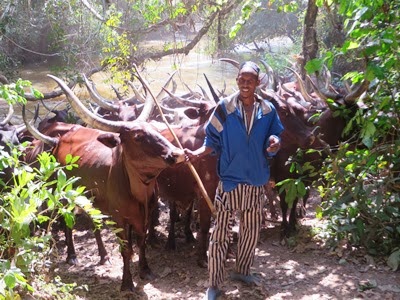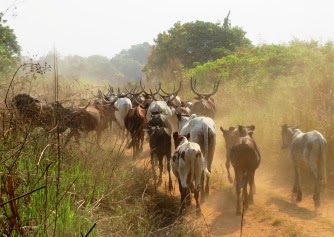 |
An open pasture where the cows could finally eat.
|
This past week, Kim Cone, a long time Missionary here, and I
went out to spend a day with a Fulani man and his herd of cattle. Since it is
dry season, grass is hard to come by, the Fulani have to migrate with their
cattle, looking for pasture. Jibriila's clan is
from up north, but have come down south, closer to the forest zone to look for
good grass.
We met him at his camp mid-morning and were given a mat
right next to his herd of some 60 cattle. The herds like to stand in tight circles
around smudge fires, which keep the flies away. The place we were sitting was
just outside of the smoke and range of the swatting tails.
We watched as Jibriila picked ticks off the cattle, administered
some injections, and then yelled to his kids to come. A string of children
ranging from around 3 to 10 years old came running, and into the herd of
cattle. Ducking under and weaving through them, they chased and pulled the calves
from the group. These children had no fear of the cows, and the cows did not
pay any attention to them, as they pushed through the herd.
 |
| Some of the smaller ones that stayed behind. |
Once the calves had been separated, the main herd was given
a few short commands, and they began moving out. Since the cattle go so far,
and fast, the young ones are separated so they will not get tired. They graze
and play closer to home, with the sheep, and are tended by the kids.
I have a new respect for the Fulani after seeing how hard
their jobs are. They have clicks, grunts, and other sounds that they use to
direct the cows. The cattle are completely tame, and their owners love and
respect them. Fulani typically don’t have gardens, but the Bantu people that
live here do. When Fulani come with cattle, they have to maneuver the cows past
and through a maze of gardens that the cows want to eat from. Kim and I took
turns standing guard next to the gardens trying to keep the cows out.
 |
| There
is a lot of dust in dry season, so the cows kicked up a lot of dust when we had to move fast past gardens. |
After a full day of herding, watering, chasing cows away
from gardens, and not much time actually grazing them, we started the walk back
to the camp. The cattle seemed to know their way, and did not need much
directing, which was nice since we were all tired from the day’s hike.
Fulfulde, the language the Fulani speak, is quite
complicated, and since coming here, I have only picked up a few words. The
culture is also very different from that of the Bantu people whom I have grown up and work with.
 |
Jibriila and his lead cow coming up from watering.
|
 |
| The cows found a road on the way home and chose to follow that as long as they could instead of going threw the brush. |
This dry season has been a hard one, and the day after Kim
and I went with Jibriila the group moved in search of greener pastures. Sometimes
there are some smaller rains during dry season that help to keep the grass
growing, but so far this year we have not had any.